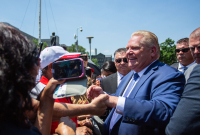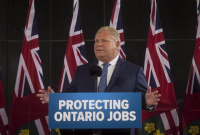Support strong Canadian climate journalism for 2025
The Trudeau government's climate change spat with Ontario Premier Doug Ford expanded across Canada on Wednesday as Alberta United Conservative Party Leader Jason Kenney argued that Ottawa was playing favourites by threatening "to punish Ontarians financially."
Kenney made the comments after federal Environment Minister Catherine McKenna told National Observer on Tuesday that the federal government was reviewing up to $420 million worth of transfer payments to Ontario after Ford's new government announced an "orderly wind-down" of its green programs.
McKenna explained that Ottawa was doing this because Ford's new Progressive Conservative government announced it was abandoning the province's climate change policies, breaking Ontario's previous commitments to participate in Prime Minister Justin Trudeau's national climate change framework.

Ford's moves would make Ontario ineligible for funding under the federal Low Carbon Economy Fund, which is a component of the national climate framework.
Kenney, a former federal cabinet minister in the Harper government, suggested that Trudeau should be doing the same thing to B.C. since the west coast province is opposing the west coast Trans Mountain oil pipeline expansion project, approved by the federal government in November 2016.
“Justin Trudeau is willing to punish Ontarians financially because they voted against a carbon tax that raises the cost of living,” tweeted Kenney on Wednesday. “But when the BC NDP blocks an approved pipeline, Trudeau just keeps on giving billions in discretionary transfers to BC.”
McKenna's office declines to respond to Jason Kenney
When asked by National Observer about Kenney's comments, McKenna’s office declined to wade into a debate with Kenney about whether to penalize B.C., instead touting the economic benefits of carbon pricing and reiterating that no climate strategy isn’t an option.
“We have a plan to reduce pollution and meet our climate targets while growing our economy and creating good jobs. That plan includes a price on pollution because it works, it’s one of the lowest-cost tools we have to fight climate change and spur clean innovation, and it’s part of any serious climate plan,” McKenna's spokeswoman Caroline Thériault told National Observer in an email.
Trudeau has previously criticized the provincial NDP government in B.C., led by Premier John Horgan, for opposing the federal approval of the Trans Mountain pipeline expansion project, warning that this opposition was "frustratingly" putting the national climate change plan in jeopardy.
The prime minister has also described the pipeline as a "trade-off" to secure Alberta's support for the climate change plan.
"... John Horgan is actually trying to scuttle our national plan on fighting climate change," Trudeau said in an interview with National Observer on Feb. 13. "By blocking the Kinder Morgan pipeline, he’s putting at risk the entire national climate change plan, because Alberta will not be able to stay on if the Kinder Morgan pipeline doesn’t go through. And you will get politicians who are picking and choosing parts of the national plan they don’t like, and if we don’t continue to stand strongly in the national interest, the things that people don’t like within the agreement — which is always filled with compromises — are going to mean that there is no agreement, and there is no capacity to reach our climate targets."
Meantime, Kenney's tweet generated pointed comments from some prominent experts on carbon pricing.
“Hi Jason, which legislative action has BC taken with which you take issue? Are you suggesting that the federal government should invoke confiscatory consequences for holding angry press conferences and/or pushing forward reference cases on jurisdiction?” Andrew Leach, professor of energy policy at the University of Alberta’s business school, wrote on Twitter in response to Kenney's initial tweet.
David McLaughlin, a veteran Conservative staffer in the Mulroney and Harper governments, noted on Twitter that Ontario's funding was conditional on adhering to Trudeau's pan-Canadian climate change and clean growth framework.
McLaughlin, who is now the director of climate change in Canada at the Winnipeg-based International Institute for Sustainable Development, also questioned Kenney's remarks, saying in a separate tweet that he had "never seen a premier-to-be argue for confiscatory federal interventionism till now."
Many climate scientists and economists have said that scrapping the shared carbon pricing market with Quebec and California will likely cost Ontario more money, hurting both businesses and consumers.
NDP Premier Rachel Notley, Kenney's main political opponent, has previously said that Ford was inviting the federal government to intervene because of his decision to cancel Ontario's climate policies.
"What Ontario is doing is opening the door for Ottawa to step in," Notley said during a news conference on June 18. "(Ontario) is walking away from a level of agency and authority that they previously had."
Ontario defends 'swift action' to bring gas prices down
NDP MP Charlie Angus reacted to the news by suggesting that "Doug Ford economics (were) already kicking in," urging his Twitter followers to expect "huge bills" to come in as a result.
Ford, who was sworn into office last week, has repeatedly railed against the notion of a carbon tax, explaining that he would be pulling out of the cap and trade system as part of efforts to keep a promise to to cut gasoline costs for motorists by 10 cents per litre.
Ontario’s Ministry of Environment, Conservation and Parks also defended the new provincial government's actions.
“Ontario has taken swift action to cancel the cap and trade program as part of its commitment to bring gas prices down and help reduce costs for Ontario families and businesses," the ministry told National Observer in a statement on Wednesday.
While Ontario has not had a carbon tax, McKenna’s office confirmed that it was soon facing an imposed price on carbon in the absence of other policies.

McKenna's office said that provinces would have until Sept. 1 to submit their climate plans to put a minimum price on pollution and demonstrate how it meets new federal standards adopted under federal legislation, Bill C-74, that was adopted in June.
"We want provinces and territories to maintain or implement a plan that works for them and meets the national standard," spokeswoman Thériault added. "It’s important to note that four provinces already had a plan to price pollution, and could opt to maintain that plan. Those plans will be reviewed in the fall to ensure they meet the national standard. Provinces and territories can also opt to implement the national backstop if they want to."
The minister's office also noted that British Columbia, Alberta, Ontario and Quebec, representing 80 per cent of the Canadian population, all had a price on carbon and led the country in economic growth last year.
The new federal legislation requires polluters to pay for carbon emissions across the country by January 2019.
"All revenues will be going back to their province or territory of origin," Thériault said. "If a provincial or territorial government doesn’t adopt a price on pollution that meets the federal standard, the legislation gives full flexibility about how to return those revenues to the province or territory. They could go back to people, to businesses, to governments, or to a combination."






Comments
The Conservative Party of Canada was NEVER a western Canadian party. The western "Reform" movement died with the merger, as did the "Wild Rose" movement with the UCP; the election of Doug Ford just goes to show it's an eastern mentality. Kenney's defense of Ontario is just another way to distance himself from Alberta.
Real western Canadians know how to plan ahead. They may sometimes lean towards libertarian ideals in terms of government, but they still know how to come together. Even for Calgary's most right-leaning riding, Kenney is just way too dirty.
Let's hope. But entitled doesn't worry about dirty.....the hired help take care of those details.
What a silly, cynical man Jason Kenny is. He knows the true situation but will lie and muddy any issue. Conservatives, by definition, plan ahead. It's supposed to be one of their principles, but it appears the time of principled conservatives is past; at least those who support that political philosophy by way of the conservative parties. As Adam Buckley says below, Kenny really is `too dirty'.
I'm scared of what's going to happen when this Kenney character becomes the next Alberta Premier, which is very likely.
Even if he did become premier, the party was solely created to oppose the NDP and for no other reason. They didn't think it through to be able to do anything. The UCP wouldn't last a full term, not even with a majority.
Depends on whether advantaged Albertans are into climate change denial...it also depends on how willing they are to put another province at risk in order to keep pushing dirty bitumen. Jason's willing conflation of climate change policies with expanding bitumen extraction is an example of how well conservatives think.
Not well, past the one-two of their reductive way of making everything black and white. And ultimately, about money...cheap beer and gasoline for the poor citizen's of Ontario, the continuation of 1% royalties for the lucky folk of Alberta, owners of the dirtiest fossil fuel on the planet.
Everyone who understands the world is more complicated are going to have to step up.
Is this the same Jason Kenney who wants to punish BC for wanting to protect the environment, who has agreed to submit its position to the courts, as we, in the "civilized" western liberal world, do?
Can he not see the difference between a province that is clearly, unilaterally cancelling an agreement and breaching the law (Ontario) and a province that has offered to submit its position to the courts (BC)?
Looks like a lot of "fake news" to me.
Reductive conservative thinking produces fake news all the time...check out the history of the Fraser Institute. And then, when their simple simon versions of reality threaten to be exposed, they accuse those who see through their conflations, as being the fake news producers. It's a simple....and so far, quite effective strategy.